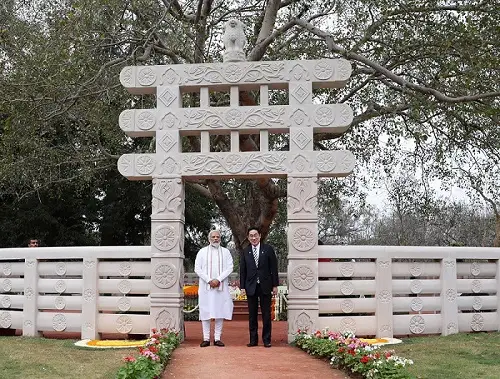

India-Japan relationship is rooted in spiritual affinity: PM Narendra Modi and Japanese PM Fumio Kishida at the Buddha Jayanti Park in New Delhi in March (Image courtesy: MEA)
Atul Aneja and Ateet Sharma
Japan on Monday unveiled its new vision for a Free and Open Indo-Pacific (FOIP) which includes integrated development of Northeast India and Bangladesh as part of a broader Bay of Bengal community.
Calling India an “indispensable partner”, Japanese Prime Minister Fumio Kishida outlined his new Indo-Pacific strategy during a policy speech at the Indian Council of World Affairs (ICWA), immediately after holding a Japan-India Summit Meeting with Prime Minister Narendra Modi at the Hyderabad House in New Delhi.
Kishida listed three important regions – Southeast Asia, South Asia, and the Pacific Islands – where multi-layered connectivity could overcome vulnerabilities and boost economic growth.
“The Northeast India, which is surrounded by land, still has unexploited economic potential. Viewing Bangladesh and other areas to the south as a single economic zone, we will promote the Bay of Bengal-Northeast India industrial value chain concept in cooperation with India and Bangladesh to foster the growth of the entire region,” said the Japanese PM.
Briefing a small media group, Noriyuki Shikata, Cabinet Secretary for Public Affairs said that right now Northeast India and Bangladesh were on Tokyo’s radar.
Myanmar will reappear in the frame once the political situation in Naypyidaw eases.
During his address, PM Kishida stressed that Japan has already launched a Joint Study Group on the possibility of an Economic Partnership Agreement with Bangladesh
Shikata pointed out that landlocked Bhutan could also be included in the broader Bay of Bengal initiative, though the focus right now was on the Northeast India-Bangladesh connect.
Prime Minister Kishida’s vision especially focused on emerging economies and developing countries in the Indo-Pacific region, including the far-flung island territories, vulnerable to climate change and natural disasters in the Pacific.
To fulfill Kishida’s vision of transparent and inclusive development of the region, Tokyo will mobilise USD 75 billion USD in public and private funds in the Indo-Pacific region by 2030.
With China’s debt-trap diplomacy as the subtext, the Japanese will focus on fair development finance which will focus on building quality infrastructure development, including undersea cables to far-flung island territories.
Kishida cited the critical situation in Sri Lanka and insisted on rules to prevent “opaque and unfair development finance” which are necessary for nations to grow autonomously and sustainably. “It is essential that Sri Lanka’s debt restructuring advances in a fair and transparent manner,” the Japanese premier observed.
He also stressed that Tokyo will closely collaborate with India in the South Asian region.
Analysts point out that Japan appears to be exploring deeper cooperation with India in South Asia as a major step before a broader engagement with New Delhi can unfurl in other geographies including the Middle East and Africa.
“I believe that Japan and India are in an extremely unique position in the current international relations and, furthermore, in the history of the world,” said the Japanese PM in his address.
Kishida chose India to make the significant announcement as it was here that Japan’s longest-serving Prime Minister, the late Shinzo Abe delivered his famous ‘The Confluence of Two Seas’ speech in the Indian Parliament in August 2007 and came up with the concept of the ‘Indo-Pacific’ for the first time.
“I cannot help but feel a sense of destiny that I am here in India to speak about my vision for a Free and Open Indo-Pacific… Here in this country, former Prime Minister Abe delivered a speech that linked the Pacific and the Indian Oceans for the first time. India is the place where FOIP came into being,” he recalled.
Promising that Japan will “spare no efforts” to cooperate with India for the success of the G20, Kishida said that both countries have a great responsibility for maintaining and strengthening “a free and open international order based on the rule of law”.
Asked whether the Chinese plan to resolve the Ukraine conflict could work, a Japanese official who did not wish to be quoted said that the United States has already rejected Beijing’s plan. He added that as the chair of the G-20 this year, India was entitled to play a peacemaker’s role to end the Ukraine war, building on PM Modi’s earlier statement during a conversation with Russian President Vladimir Putin that “ours is not an era of war”.
In view of the emphasis on the Global South to spread the culture of transparency, human rights, democracy, and problem-solving through dialogue, Japan will be inviting Cook island, Comoros apart from Vietnam, Brazil, Australia, South Korea, and Indonesia, apart from India for the G-7 that will be hosted in Hiroshima in May this year, Shikata said.
Also Read: Watch: PM Modi and Japanese PM speak on expanding India-Japan partnership
The Jammu and Kashmir Disaster Management Department conducted a mock drill simulating a Glacial Lake…
The Indian Institute of Technology (IIT) Guwahati researchers have developed a community-scale water treatment system…
Union Minister for Environment, Forest and Climate Change, Bhupender Yadav on Friday chaired an Interactive…
The Voice for Baloch Missing Persons (VBMP) has demanded the swift release of two Baloch…
The Israeli Defence Forces shared that on Thursday night it targeted the missiles manufacturing sites…
Prime Minister Narendra Modi is set to flag off the Vande Bharat Express connecting Patliputra…